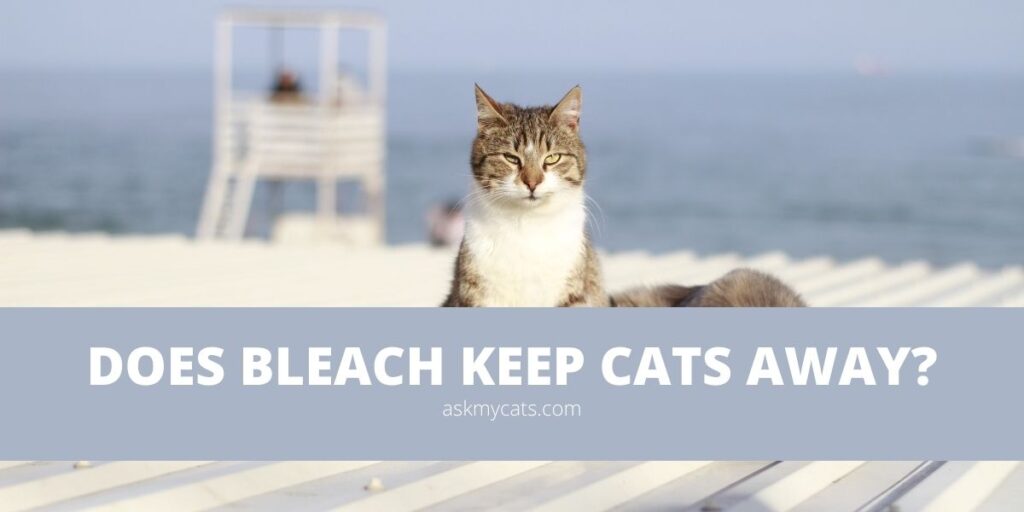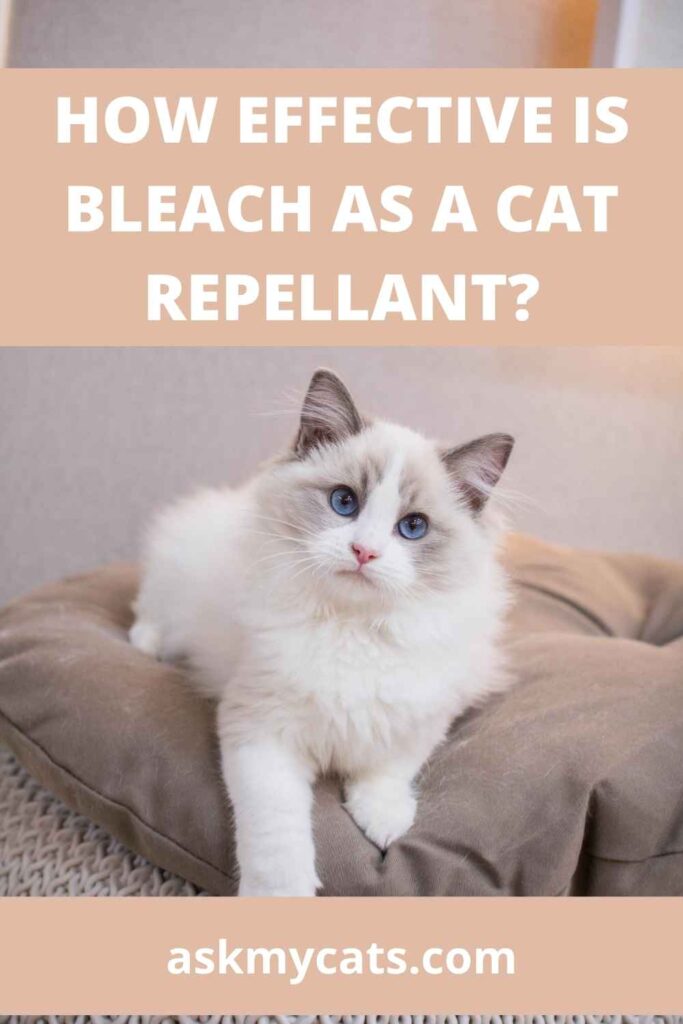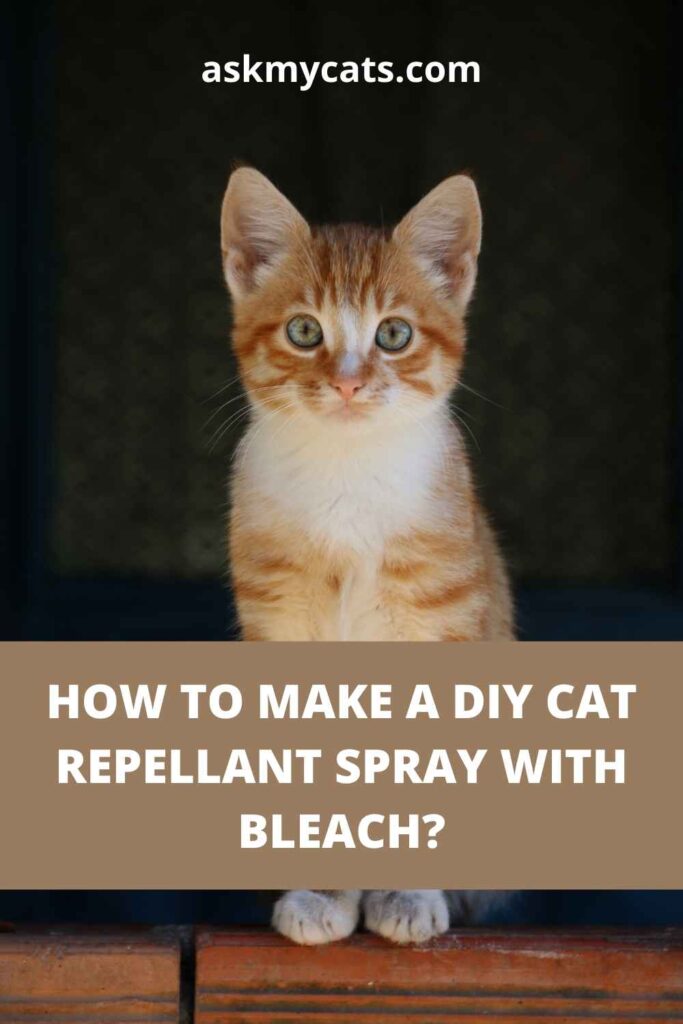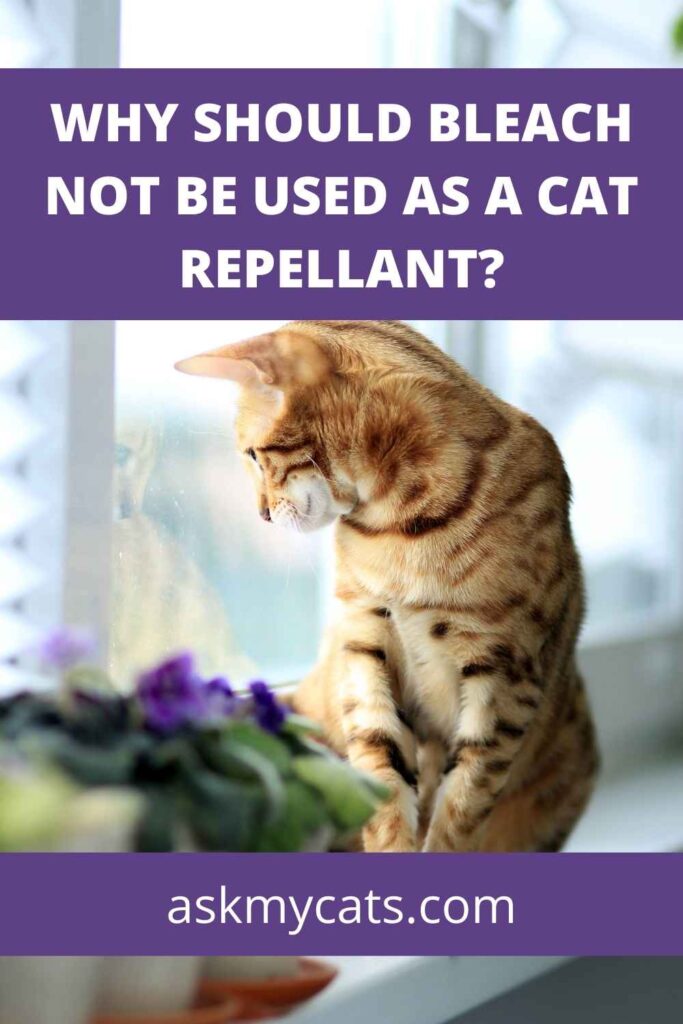Do you want to keep cat poo out of your lovely garden? It makes perfect sense how incredibly frustrating it must be to maintain a garden and make it seem lovely, only to find that it is full of cat feces.
You could feel a little on edge and be tempted to use bleach or other severe methods, but please resist the urge.
Cats may be repelled from particular locations and kept out of gardens and homes using a variety of techniques.
Many of the suggestions in this article are excellent and have solved cat-related difficulties for many individuals. What about bleach, though? Will bleach keep cats away?
Yes, bleach might keep cats out of your garden, but it is not a given. There are ethical issues with using bleach in the garden and it is cruel to use it to deter cats.


Give Your Cat the Perfect Day
Get the Free Ebook!
How Effective Is Bleach As A Cat Repellant?

It may occasionally be successful. It appears that a small number of individuals use it religiously and spray water and bleach solutions into their wheeled trash cans to deter cats from peeing there.
However, a lot of individuals have also said that this is ineffective.
You would assume that it would. Bleach is poisonous and has an abhorrent odor to humans. If you purchase lemon-scented bleach, you’ll have the bonus of bleach and citrus scents! A combination that a cat ought to detest.
Unfortunately, there isn’t concrete proof that bleach will stop cats from urinating in your yard. The prevailing view is that bleach can attract cats instead of repelling them!
Nobody appears to be able to explain why many cats appear to enjoy the scent of bleach and would want to roll about in it.
They appear to be having a blast, which is the exact opposite reaction that folks trying to frighten cats are hoping for.
How To Make A DIY Cat Repellant Spray With Bleach?

Consider experimenting with these DIY cat deterrents. Not all cats respond well to home remedies.
Offering healthy, natural alternatives to your cat’s innate behavior may need some experimentation, but they are safer and more long-lasting than harsh reprimands or harsh poisons.
Cats have a sense of smell (or odor detection) that is around 40 times more sensitive than ours. A cat’s excellent sense of smell will be crucial in creating a natural cat repellant. T
ry one of the other recipes if you discover that the first one isn’t working. Because cats are individuals with diverse likes and dislikes, something that you would find offensive can be his cup of tea.
Interesting Read: Do Used Tea Bags Keep Cats Away?
Bleach-based cat repellents are ineffective. It is not advisable to use bleach in a method that might be consumed by cats or other animals.
They could get murdered by it, that much is certain. Do not spray a bleach-treated area if you notice animals or other creatures scratching, consuming, drinking, or resting there.
But if you are still persistent on how to make a bleach-based repellent here is an easy method to prepare it with ingredients you already have at home.
Instructions: Make sure the workspace you are making the repellent in, is well ventilated, and you are wearing personal protective equipment like clean gloves.
You will need :
1. Tap water
2. Unexpired bleach
3. Gloves
4. Container
We will need 2.5 tablespoons of bleaching liquid for every 2 and 1/2 liters of water, do it very carefully making sure you do not spill any, also do not mix any chemical cleaning products or household chemicals that can produce toxic fumes and hazardous material.
Before spraying it around do a spot test to check if the fumigation is extreme as cats have a stronger sense of smell it might be a little harsh on them, and make them ill before keeping them away.
Before usage, be sure to properly mix any solution.
NOTE: Because the words gallon and pint have different volumes in the US and the UK, I’ve used L (liters).
This online dilution calculator will help you determine how much bleach you need with water in other units so that you can use whatever local volume measurement you’re used to.
However, I can’t promise its correctness, so please double verify your result.
Also, check out Does Vinegar Keep Cats Away?
Why Should Bleach Not Be Used As A At Repellant?

Yes, bleach could on occasion deter cats. It does not, however, always work. Whether it is effective or not, using bleach to deter cats is cruel.
There are other ways to deter cats from entering your porch, house, or yard. Bleach shouldn’t be sprayed in areas where cats drink, sleep, or scratch since it could damage them, according to cat specialists.
Both cats and other animals, such as dogs, are harmful to bleach. Even while the bleach you have at home is not corrosive, cats may nevertheless become irritated if they come into contact with it.
Professional cleaners’ use of commercial bleach can result in sores and lesions on a cat’s skin, stomach, and throat. Bleach made without chlorine might irritate tissues and make people throw up.
However, some cats may experience the reverse reaction to bleach since they are drawn to the chlorine present in the majority of commercial varieties. Some cats would even lick it and rub themselves all over it, exactly as they would with catnip.
There are also humane methods of preventing cats from entering your home that pose no health hazards.
Any chemical agent that cleans and eliminates stains while also removing colors from textiles is referred to as bleach. Both commercial and residential uses are made of the items.
Sodium hypochlorite, sometimes known as liquid bleach, is used to make bleach. It is used to eradicate weeds, get rid of mildew, disinfect pools to prevent bacteria and viruses, and prolong the life of cut flowers.
Both the environment and living things are poisoned by bleach. Strong vapors emanate from it. It can affect the health of living creatures when breathed. The skin, lungs, and eyes are all irritated and negatively affected by it.
You might also like to read Does Black Pepper Keep Cats Away?
What Are The Alternatives To Bleach For Cat Repellants?
As we have mentioned, bleach’s biggest drawback is that it is harmful. Humans are poisonous to it. Dogs are harmful to it. The majority of animals, insects, and wildlife are poisoned by it. And sure, cats are also poisoned by it.
Any animal that comes into touch with bleach may have skin rashes and burns. If the bleach is consumed or, even worse, is absorbed into the skin, it may result in serious disease or even death.
There are several additional non-harmful cat repellant options that you might think about.
Alternatives for Indoors :
1. As a cat repellent spray, use a mixture of water and apple cider vinegar.
2. As a cat deterrence spray, citronella, lavender, peppermint, or lemongrass essential oils can be combined with water.
3. Cats will be kept away from kitchen counters with the use of aluminum foil.
Alternatives for Outdoors :
1. Around your yard or garden, place lavender, peppermint, or citronella plants.
2. Sprinkle odor-blocking powders throughout your home, including the garden. The plants in your yard won’t be harmed by these natural powders, which imitate the scent of a cat’s predators like coyotes and foxes.
3. Use sprinklers with motion detection.
4. Coffee grounds should be applied to the ground.
5. Lay plastic or chicken wire fence on the ground.
Also, check out Will Cayenne Pepper Keep Cats Away?
Do Cats Hate The Smell Of Bleach?
This is not as absurd a question as you may assume since many cats appear to have a passion for bleach. The biochemical odor of cat poop can be somewhat compared to the chlorine in bleach (and also the ammonia in other cleaning solutions).
Because of their very acute sense of smell, cats can detect things that humans cannot. Therefore, what may be an undetectable dose of bleach to our noses may be quite strong to a cat’s nose.
The next time you consider using Domestos, keep in mind that some cats may start to urinate in these places because they are persuaded that the bleach smells like cat poop.
Other cats can put on quite a show when they come across a surface that has been touched by bleach since they seem to be particularly drawn to its fragrance. It resembles the enthusiastic rolling, purring, and cheek-rubbing you see with cat nip.
Although this reaction may appear to be innocent enough, your cat is consuming an irritating toxin if they rub bleach on their fur and then lick it off (sodium hypochlorite).
Because it has the ability to dissolve the proteins in bacteria, fungus, and viruses, bleach cleans surfaces. But bleach also corrodes the proteins in mammalian tissues because of its ability to degrade proteins.
It results in ulcers of the mouth, the remainder of the gastrointestinal system, paw pads, eyes, skin, and eyes.
Drooling, trouble swallowing, vomiting, stomach pain, and sore eyes (watery red eyes, squinting/closed eye(s), scratching at eyes) are therefore signs of bleach exposure.
Because bleach is dangerous to cats, you should never let your cats reach parts of your home where you use goods containing bleach. The more concentrated the solution, the more harm it will do.
You might also like to read about why do cats like bleach
Frequently Asked Questions
Does vinegar work as cat repellent?
Your cats may stay away from certain locations and objects in and around the house if they don’t like the scent of vinegar. Vinegar can be used as a cat training aid and deterrent.
What happens if bleach gets on a cat?
It results in ulcers of the mouth, the remainder of the gastrointestinal system, paw pads, eyes, skin, and eyes. Drooling, trouble swallowing, vomiting, stomach pain, and sore eyes (watery red eyes, squinting/closed eye(s), scratching at eyes) are therefore signs of bleach exposure.
Final Words
Cats are at grave risk from the bleach. Keep it as far away from them as you can, please. If you want to use bleach to keep cats away, though, you could find that some cats find it to be attractive instead.
Although bleach could deter cats, neither we nor any other source would guarantee that it would. The cat could suffer long-term harm, and other garden animals and plants may also be affected.
We advise using a natural cat deterrent as an alternative.
Also, check out Does Ammonia Keep Cats Away?
Also, check out: Does Irish Spring Soap Keep Cats Away?
Must Read: 5 Natural & Safe DIY Home Remedies to Keep Cats Away
